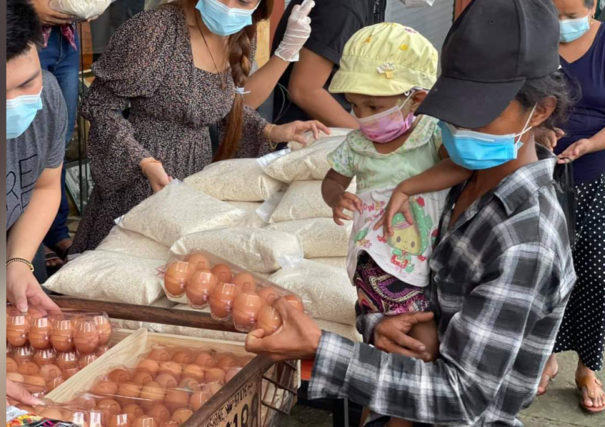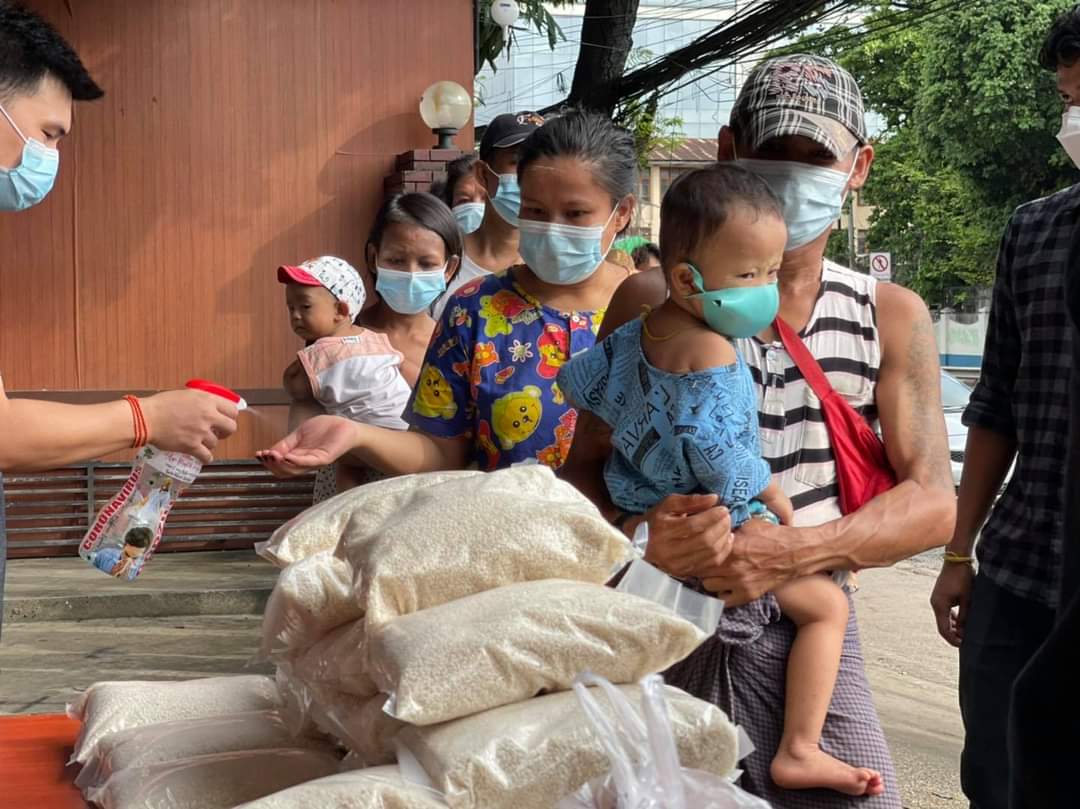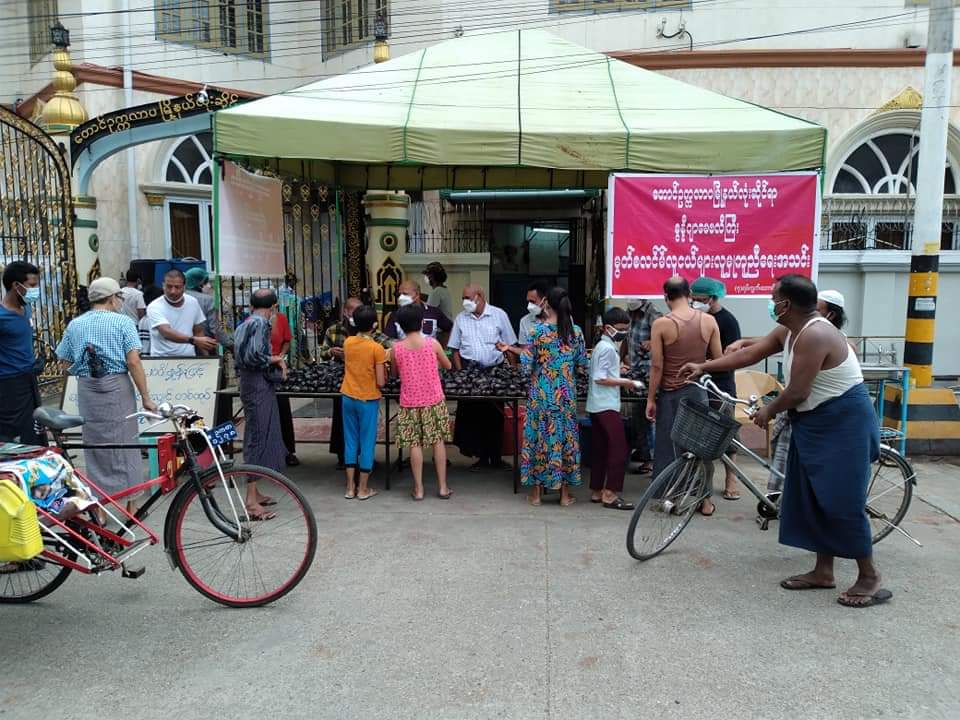It’s sad but true that most of the time when Myanmar people face life and death situations, they can’t rely on their government. Take Cyclone Nargis, which devastated the country’s Ayeyarwady Region in 2008 and killed more than 130,000 people. It was well-wishers from other parts of the country who rushed down with aid to the delta when the country’s then regime stubbornly rejected international humanitarian assistance.
Fast forward to 2021. With the Southeast Asian country being ravaged by the deadly COVID-19 outbreak under the country’s latest military regime, people find themselves depending on each other for their survival once again, as the ruling military is doing a poor job of easing the suffering of the people and controlling the pandemic, instead continuing to escalate their crackdown on civilians who oppose its rule.

In short, nothing more truly reflects the spirit of “for the people, by the people” than Myanmar’s situation today.
Recently, when Yangon was reeling from the impact of COVID-19, some well-wishers launched a campaign by selling basic food items at greatly reduced prices, as little as 100 kyats—or five times less than you pay for a cup of tea today—for those in need, as many face hunger amid staple food price spikes and rising unemployment due to the pandemic.
When poultry product prices spiked recently as people rushed to buy more eggs to boost their immune system against the virus, Flannel Box, a clothing store in Yangon, started selling eggs at only 5 kyats each in late July.
The price of eggs jumped to two or three times their normal price of under 150 kyats to 200-300 kyats each at that time, leaving poor people unable to afford them. When it was reported, regime leader Min Aung Hlaing just said the military had been poultry farming for nearly six years and would get his troops to sell eggs to the people. But so far it hasn’t happened.
“This is the time that we need to share what we have and help the needy residents,” Ko Ye Zaw from Flannel Box told The Irrawaddy.
The shop has also begun selling other basic food items at 50 kyats per unit, such as rice, onions and instant noodle packs, to help people who are struggling to feed themselves and their families.

His reason for selling them at hugely discounted prices was simple: he didn’t want youths who lost their jobs and were struggling with the cost of living, as well as poor people, to feel ashamed or reluctant to come. Thus, instead of giving them out for free, he decided to sell them at a new reduced price.
The campaign has been hugely praised and inspired many people to follow suit in other townships in Yangon and in other cities in Mandalay Region, Shan State and Kachin State.
In Kachin State’s jade town Hpakant, young people put basic food items including rice and canned fish on sale at 100 kyats per item on Wednesday in an effort to help low-income families during the COVID-19 outbreak.

The Sunni Jame Mosque Welfare Society in South Okkalapa Township in Yangon is also selling one bag of rice for 100 kyats—nearly free—to those who are in need this week.
Contrary to what people are facing now, in the previous first and second waves of COVID-19, the country’s elected civilian government, which was ousted by the junta in a Feb. 1 coup, provided basic food and cash handouts for those struggling across the country during the COVID-19 shutdown. The food distribution came after the country’s first fatality was reported during the first wave, followed by cash handouts and reduced power bills to encourage people to stay at home.

This time the regime made a few so-called “donations” at a handful of places—just enough to be photographed and aired on its propaganda channels—over the past month.
Myanmar managed to cope with the previous two waves, but as the country saw its deadliest month of the pandemic so far in July, the junta failed to provide health assistance to the sick.
And even well-wishers who sought help for those who are struggling faced obstructions from junta forces and its appointed local authorities in some places, claiming those seeking aid were breaking bans on mass gatherings under COVID-19 rules as long queues formed at places where needed items were being sold.
Mazely Flannel, a clothing store in Yangon, began selling four basic foods together for only 100 kyats but had to call off its first sale recently when junta forces came and broke it up.
Ko Min Zan Re from the shop said an army truck arrived in haste nearby as crowds gathered and the regime forces and local authorities came and told him repeatedly that the sale was a violation of COVID-19 rules.
As a final warning, he was threatened with a jail term if he failed to call off the sale within 30 minutes.
In Tamwe Township, a shop selling rice for only 100 kyats was also threatened with a ban by an official for not seeking his approval for the event.
To avoid similar obstructions, the sellers chose to go mobile, selling door to door.
Mazely Flannel sold door to door to 500 households in a ward in South Dagon and to 150 households in a ward in Kyit Myin Daing Township, and plans to sell to another 3,000 households.
Ko Min Zan Re from Mazely Flannel said many families are struggling to feed themselves as they have no income after losing their jobs, forcing many to skip meals or eat less nutritious food.
“We can’t stop because we’re obstructed. We must help residents who are in serious trouble in this time of political, economic and health crisis,” he said.
Flannel Box is also planning to use cars to reach 1,000 people in its third mobile sale, in order to avoid further obstruction and to continue to reach residents who are truly in need.
As with basic food items, the prices of pulse oximeters, commonly used medicines and medical gadgets have skyrocketed amid a sharp rise in demand; some items are even out of stock.
In several cities in Myanmar, generous groups in the community including the New Aye Sunni Jame Mosque Welfare Society have also stepped in and offered such items at low prices or free to the sick and those who need help.
“People are caring for each other. I have seen many willingly give up their places in queues to people needier than them,” Ko Ye Zaw said.
“With people’s collective effort, I believe this difficult time will also be over soon,” he added.
You may also like these stories:
Myanmar Junta Pushing Ahead with China-Backed Kyaukphyu SEZ and Port
Myanmar Junta Vaccinating Prisoners Against COVID-19
ASEAN Lags Behind Myanmar Curve

















